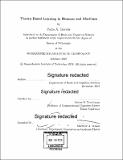Theory-based learning in humans and machines
Author(s)
Tsividis, Pedro A.
Download1103712391-MIT.pdf (12.45Mb)
Other Contributors
Massachusetts Institute of Technology. Department of Brain and Cognitive Sciences.
Advisor
Joshua B. Tenenbaum.
Terms of use
Metadata
Show full item recordAbstract
Humans are remarkable in their ability to rapidly learn complex tasks from little experience. Recent successes in Al have produced algorithms that can perform complex tasks well in environments whose simple dynamics are known in advance, as well as models that can learn to perform expertly in unknown environments after a great amount of experience. Despite this, no current AI models are able to learn sufficiently rich and general representations so as to support rapid, human-level learning on new, complex, tasks. This thesis examines some of the epistemic practices, representations, and algorithms that we believe underlie humans' ability to quickly learn about their world and to deploy that understanding to achieve their aims. In particular, the thesis examines humans' ability to effectively query their environment for information that helps distinguish between competing hypotheses (Chapter 2); children's ability to use higher-level amodal features of data to match causes and effects (Chapter 3); and adult human rapid-learning abilities in artificial video-game environments (Chapter 4). The thesis culminates by presenting and testing a model, inspired by human inductive biases and epistemic practices, that learns to perform complex video-game tasks at human levels with human-level amounts of experience (Chapter 5). The model is an instantiation of a more general approach, Theory-Based Reinforcement Learning, which we believe can underlie the development of human-level agents that may eventually learn and act adaptively in the real world.
Description
Thesis: Ph. D., Massachusetts Institute of Technology, Department of Brain and Cognitive Sciences, 2019 Cataloged from PDF version of thesis. Includes bibliographical references (pages 123-130).
Date issued
2019Department
Massachusetts Institute of Technology. Department of Brain and Cognitive SciencesPublisher
Massachusetts Institute of Technology
Keywords
Brain and Cognitive Sciences.